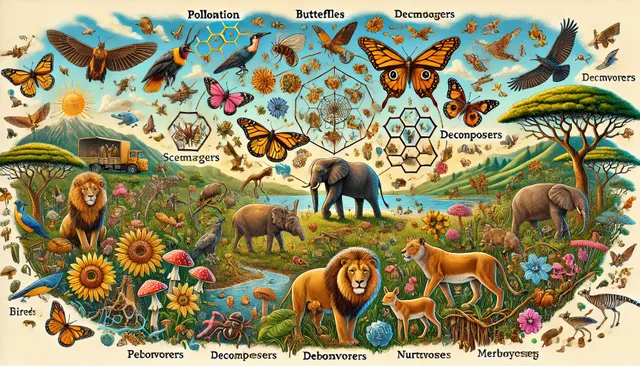Wild animals are more than just majestic creatures we admire from afar. They are crucial cogs in the wheel of our ecosystem, each playing a vital role in maintaining the delicate balance of nature. Understanding the significance of wild animals helps us appreciate their existence and underscores the importance of their conservation. 🐾

Biodiversity: The Foundation of Ecosystems 🦋
Biodiversity refers to the variety of life on Earth, encompassing different plants, animals, and microorganisms. Wild animals are a key component of biodiversity, contributing to the health and stability of ecosystems. Here’s how:
- Pollination: Insects like bees and butterflies pollinate plants, which is essential for the production of fruits, vegetables, and seeds.
- Seed Dispersal: Birds, bats, and other animals spread seeds, helping plants to reproduce and thrive in different areas.
- Predation: Predators keep prey populations in check, preventing overgrazing and maintaining vegetation balance.
Wild animals maintain ecosystem functionality, ensuring that natural processes like pollination and seed dispersal continue. Without them, ecosystems would fail, affecting all life forms, including humans. 🌺
Food Webs and Nutrient Cycling 🌿
Wild animals are integral to food webs, the complex interconnection of who eats whom in an ecosystem. They help in nutrient cycling, ensuring that essential elements like carbon, nitrogen, and phosphorus move through the environment effectively. Here’s a closer look:
- Decomposers: Animals like fungi and insects break down dead matter, returning nutrients to the soil, which supports plant growth.
- Scavengers: Creatures like vultures and hyenas clean up carcasses, preventing the spread of disease and recycling nutrients.
- Herbivores: Animals that feed on plants help in controlling plant populations, allowing a variety of plant species to coexist.
These roles highlight how every animal, no matter how small, contributes to the sustainability of our environment. 🌱
Cultural and Economic Significance 🏞️
Wild animals also hold cultural, recreational, and economic value. They inspire art, folklore, and traditions worldwide. Wildlife tourism, including safaris and bird watching, generates significant revenue and provides jobs, especially in developing countries. This economic incentive can drive conservation efforts, protecting both animals and their habitats. 💼
Medical and Scientific Contributions 🧬
Wildlife has been a source of medical discoveries. Compounds from various plants and animals have led to the development of essential medicines. For example:
- Snake Venom: Used in developing treatments for heart attacks and blood clots.
- Plant Extracts: Many modern medicines are derived from plant compounds discovered through studying wildlife.
Additionally, observing wild animals helps scientists understand diseases, ecosystems, and evolutionary processes, contributing to scientific advancements. 🔬
The Call for Conservation 🌳
Despite their importance, wild animals face numerous threats, including habitat loss, climate change, poaching, and pollution. Conservation efforts are crucial to protect these creatures and the ecological balance they support. Key strategies include:
- Protected Areas: Establishing national parks and reserves to safeguard habitats.
- Anti-Poaching Measures: Strengthening laws and enforcement to combat illegal hunting.
- Community Involvement: Engaging local communities in conservation efforts, providing education, and alternative livelihoods.
By prioritizing conservation, we ensure that wild animals continue to play their indispensable roles in our ecosystems. 🌲
Conclusion 🌟
Wild animals are indispensable to the health of our planet. They support biodiversity, aid in nutrient cycling, and provide cultural, economic, and scientific benefits. Protecting them is not just an environmental issue but a necessity for sustaining life on Earth. As stewards of the planet, we must commit to preserving wildlife for future generations, ensuring a balanced and thriving ecosystem. 🌏
Congratulations, your post has been upvoted by @upex with a 0.97% upvote. We invite you to continue producing quality content and join our Discord community here. Visit https://botsteem.com to utilize usefull and productive automations #bottosteem #upex
Downvoting a post can decrease pending rewards and make it less visible. Common reasons:
Submit
thanks
Downvoting a post can decrease pending rewards and make it less visible. Common reasons:
Submit